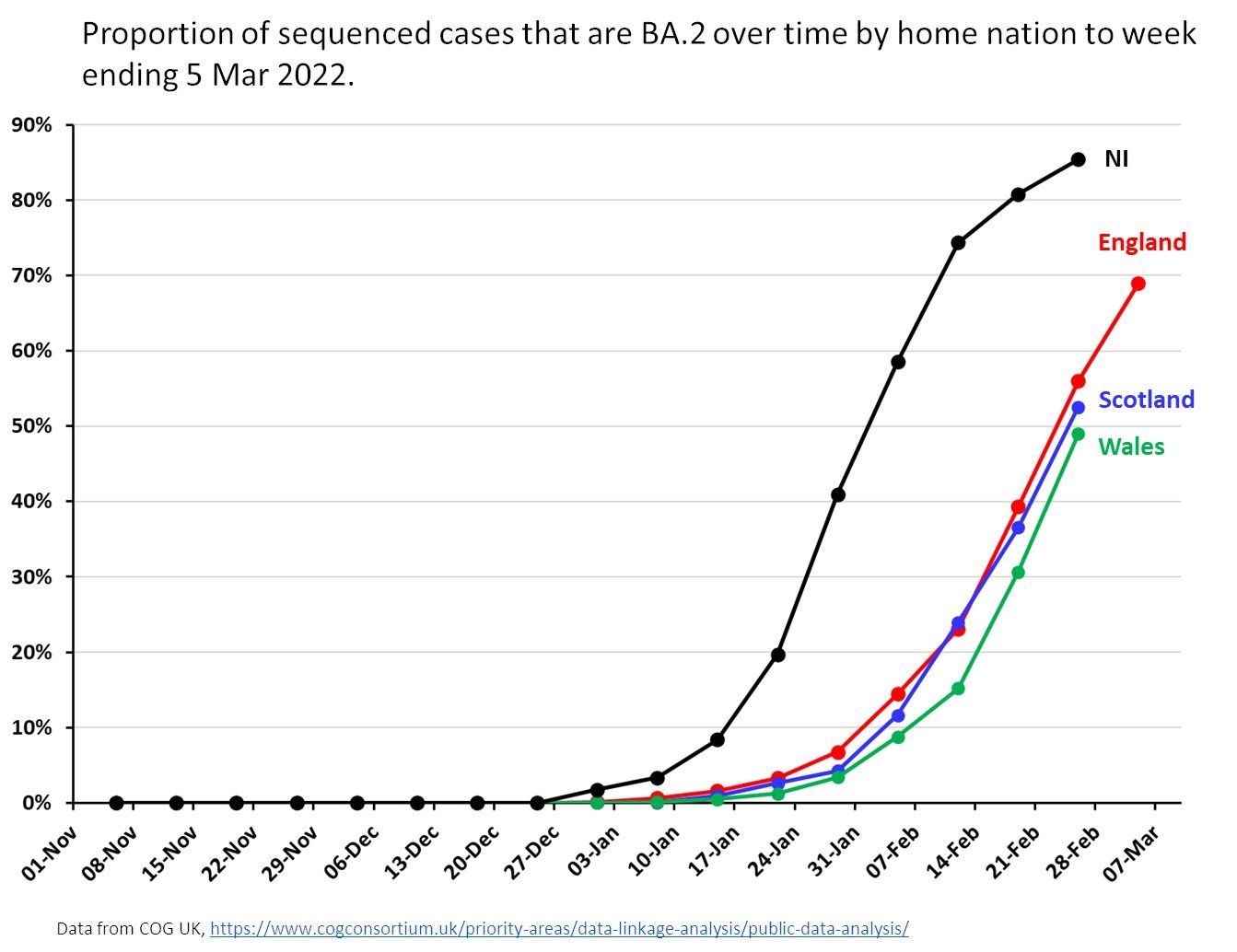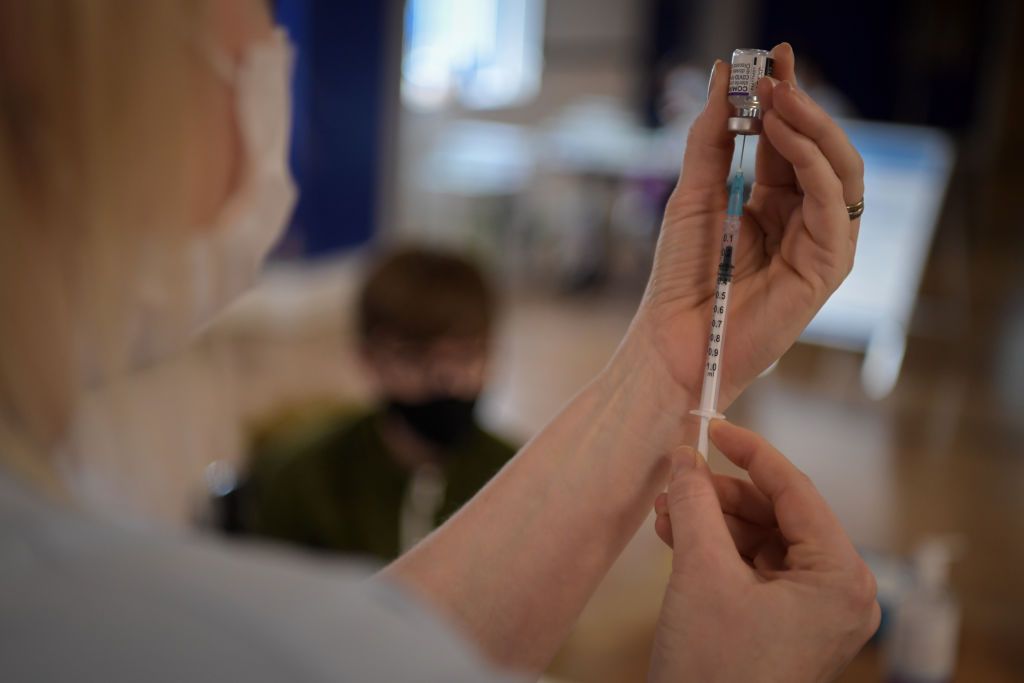There's a new variant, a new Omicron sub-variant and deaths are on the rise again
Less than two weeks after the final pandemic restrictions were lifted, hundreds of Brits are still dying from covid, but no one is talking about it.
So, is the covid threat really over, and are we "learning to live with it", or are we just learning to ignore it?
Here's where we are with covid cases right now
Infections in the UK had been falling since the Omicron peak in January, but, they're on the rise again.
There were just over 118,000 average daily cases in January and 53,000 daily average cases in February.
But infections increased over 50 per cent in the most recent seven days of data compared to the previous week, with daily cases rising to over 70,000, to March 10. During the same period last year, there were just under 6,000 confirmed cases (though we had been in lockdown for two months).
One in 35 people tested positive for covid between February 8 and March 1, according to nearly 100,000 swab tests carried out at homes across England.
The REACT study, carried out by Imperial College London, found covid cases appear to be rising particularly in older people, with cases either level or rising in those aged 55 plus.
https://twitter.com/HackneyAbbott/status/1501861927340818434
Scientists also looked at the R-value - the average number of people an infected person passes the virus to. This remained below 1 for those aged 54 and under, meaning cases are declining. But the R-value was 1.04 for over 55s, meaning cases are increasing amongst this age range.
And are people getting proper sick, like hospital sick?
Covid hospital admissions are going up, and it's happening "quite sharply", as UCL Professor Cristina Pagel pointed out on Tuesday.
https://twitter.com/chrischirp/status/1501250077305749506?s=21
Over 9,000 people were admitted to UK hospitals with covid in the most recent week of data (February 28 to March 6) - over 17 per cent more than were admitted in the seven days prior.
Covid is still putting strains on hospitals, with
three wards in Jersey closing this week in a bid to stop the virus spreading. There are 51 patients in hospital with coronavirus there - the highest number since the pandemic started.
And are people still dying?
Covid deaths had been plummeting in the UK since the Omicron surge in January, until a recent spike this month.
In February, deaths peaked at 552 on the 2nd, but largely they were falling across the month.
Deaths have increased again slightly in recent data. Over
700 people died within 28 days of testing positive for the virus in the seven days to March 10.
The death toll is, however, a long way off January 2021 figures, when it regularly reached 1,000 a day. And a far cry from the
6,000 deaths a day that SAGE scientists predicted would happen because of the Omicron wave.
Why now?
[caption id="attachment_322377" align="alignnone" width="1024"]

We are no longer required to wear face masks by law (Getty)[/caption]
As has been the case for most of the pandemic, there is no simple answer.
Professor Paul Elliott, director of Imperial's REACT study, said the recent increase was probably a result of factors such as the lifting of all covid legal restrictions, more mixing between age groups, and waning protection from booster shots.
UCL's Professor Pagel said the Omicron sub-variant, BA.2, could also be causing more infections.
"I worry that we will be stuck at high levels for a long time," she added.
What's the deal with the BA.2 sub-variant?
We all know about the really transmissible Omicron variant that ruined our lives in the build-up to Christmas - that was known as BA.1.
And now, its close cousin, BA.2, has turned up, or the "stealth" variant as it is known, and the World Health Organisation (WHO) says it is dominant in several countries. Currently, it accounts for around half of all Omicron cases in England, with levels currently highest in London.

The variant appears to be more transmissible than the original,
WHO confirmed in late February, which might account for the spike in UK cases.
But in terms of severity, it doesn't seem to be any worse, WHO said, having assessed data from the UK, South Africa, and Denmark (where immunity from vaccination is high).
The good news is if you've had the original Omicron variant, chances are you might be somewhat protected from the new one, a
report by the WHO revealed.
A preliminary assessment by the UK government didn't find vaccines to be any less effective against BA.2 and Imperial said BA.2 does not seem to evade immunity any more than the O.G. Omicron.
Widespread immunity from vaccines and past covid infections make it difficult for scientists to know how big a wave of infections and hospitalisations BA.2 could cause.
And now 'Deltacron'?
Yes, on top of this, a brand new variant has just been detected in 17 patients in Europe and America.
It's a mixture of genes from both Delta and Omicron combined, hence 'Deltacron'.
It is too soon to know whether Deltacron infections will be very transmissible or cause severe disease, Philippe Colson of IHU Mediterranee Infection in France said.
So, are we talking more boosters?
[caption id="attachment_322343" align="alignnone" width="1024"]

Jabs will start to be offered again pretty soon[/caption]
Vaccinations will be pushed out again from early April, when over 75s, care home residents and clinically vulnerable people will be offered another shot.
Professor Peter Openshaw, a member of the government’s New and Emerging Respiratory Virus Threats Advisory Group (Nervtag), told the Guardian that additional doses are "almost certainly going to be necessary.”
Dr Jenny Harries, the chief executive of the UK Health Security Agency (UKHSA), acknowledged that cases have declined "substantially" since the peak of the Omicron wave, but told
The Mirror that “the increasing presence of BA.2 and the recent slight increase in infections in those over 55 show that the pandemic is not over and that we can expect to see Covid circulating at high levels."
So if cases are on the up, why are we hearing less about it?
As restrictions were dropped, so was the regular drip of covid stats.
Weekend updates were scrapped in late Feb, with data on covid cases and deaths now only published Monday to Friday. The figures for Saturdays and Sundays are fed into Monday's totals.
Should we be worried?
All these figures can be a lot to take in, and with so many factors at play, it can be hard to know how worried we should really be.
But as the experts see it, there is definitely cause for concern as a result of the government's previous and current plan of action.
Professor of immunology at Imperial College Danny Altmann, who is not on the React-1 study, told
The Guardian the recent rise was foreseeable, adding: “Caseloads were by no means low or under control as we came out of all mitigations and, when you add in waning immunity and the enhanced transmissibility of BA.2, it looks like we are in for a difficult period, especially for the elderly.”
Anil Soni, chief executive of the WHO Foundation, has criticised the UK's decision to dismantle covid testing from April, telling
The Independent it was "very worrying".
People are simply "looking the other way" from countries with low vaccine rates, in a bid to convince themselves covid is over, the WHO leader argued. When actually, low vaccine coverage is a "Petri dish" for future variants to breed, he said.
Related stories:









